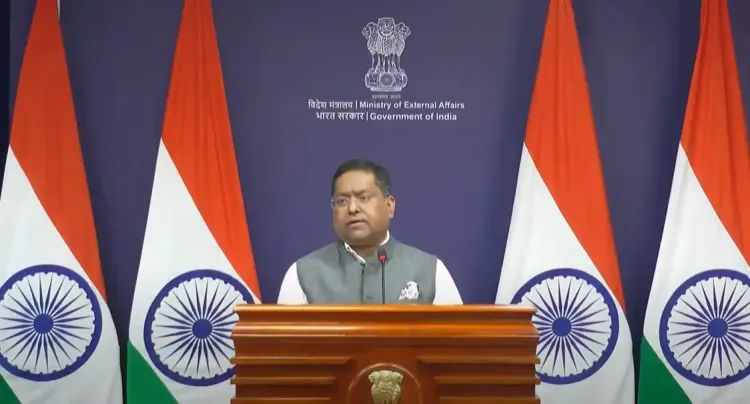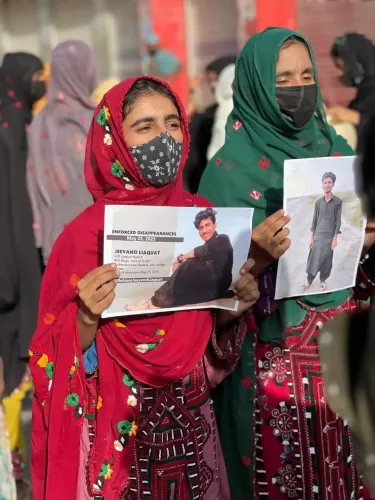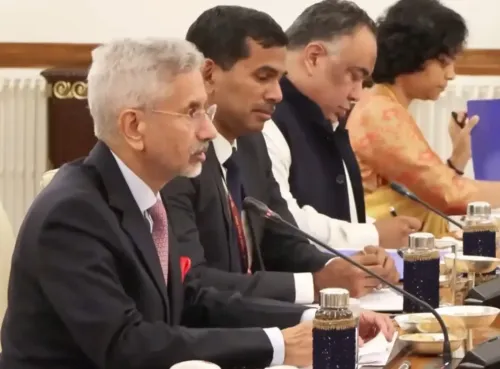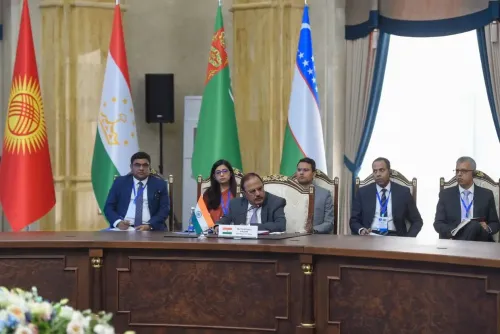Is Pakistan Blaming Neighbors for Its Own Internal Failures Amid Afghan Tensions?

Synopsis
Key Takeaways
- Pakistan often shifts blame for its internal issues onto neighboring countries.
- India is committed to supporting Afghanistan's sovereignty.
- A 48-hour ceasefire has been established amidst rising tensions.
- Recent clashes resulted in significant civilian casualties.
- Diplomatic resolutions are essential for regional stability.
New Delhi, Oct 16 (NationPress) Emphasizing that Pakistan has a tendency to shift blame onto its neighbors for its own internal shortcomings, India stated on Thursday that it is vigilantly observing the developments along the Pakistan-Afghanistan border.
During a weekly press briefing in New Delhi, Ministry of External Affairs (MEA) spokesperson Randhir Jaiswal indicated that Pakistan continues to harbor and endorse terrorist operations.
When questioned about India's stance on the escalating tensions at the Afghanistan-Pakistan border, Jaiswal replied, "Our surveillance of the situation is continuous. Three points are evident – first, Pakistan harbors terrorist groups and advocates terrorist activities. Second, it is a longstanding tactic of Pakistan to accuse its neighbors for its internal dilemmas. Third, Pakistan is disturbed by Afghanistan's assertion of sovereignty over its own lands. India remains steadfast in its support for the sovereignty, territorial integrity, and independence of Afghanistan."
The MEA's remarks come amid rising border conflicts between Afghanistan and Pakistan, triggered by multiple clashes and airstrikes in recent days.
On Wednesday, both nations announced a mutual agreement for a 48-hour ceasefire. Taliban spokesperson Zabihullah Mujahid noted that the ceasefire was established following a request from the Pakistani authorities.
"Following the request and insistence of the Pakistani side, a ceasefire will take effect between the two nations after 5:30 PM. The Islamic Emirate also instructs all its forces to adhere to the ceasefire post 5:30 PM unless violated," Mujahid stated on X.
Pakistan's Foreign Office confirmed the agreement for a temporary halt to hostilities for 48 hours to facilitate the resolution of ongoing issues through diplomatic channels.
As reported by the Taliban spokesperson, 12 Afghan civilians lost their lives and over 100 were injured due to attacks by Pakistani forces in the Spin Boldak district of southern Kandahar province on Wednesday.
He mentioned that Pakistani forces initiated an assault on the border district early in the morning with both light and heavy weaponry. Multiple Pakistani soldiers were reportedly killed in the Afghan forces' counteraction, according to Khaama Press, a prominent news agency in Afghanistan.
"Regrettably, this morning, Pakistani forces once again launched attacks using light and heavy weaponry on Afghanistan in the Spin Boldak district of Kandahar, resulting in the deaths of over 12 civilians and injuries to more than 100. Consequently, Afghan forces were compelled to retaliate," Mujahid posted on X.
"During the retaliatory operations, several Pakistani aggressor soldiers were killed, their posts and centers were seized, weapons and tanks were captured by Afghan forces, and a significant portion of their military installations was destroyed. Nevertheless, the mujahideen remain resolute in defending their homeland, sanctuaries, and people," he added.









